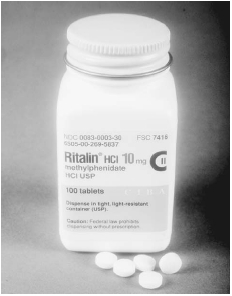Ritalin's Impact on the Developing Brain
by Jason von Stietz, M.A. - July 31, 2017

Does medication taken to treat ADHD in children have a long-term impact on the brain? Researchers in the Netherlands examined the impact of methylphenidate, or ritalin, on the developing brain. The researchers used magnetic resonance spectroscopy scans to determine that methylphenidate use before the age of 23 related to altered levels of GABA, an inhibitory neurotransmitter, in the medial frontal cortex. The study was discussed in a recent article in Medical Xpress:
“The prevalence of ADHD has increased rapidly over the last few years,” said Michelle M. Solleveld of the University of Amsterdam, the study’s corresponding author. “With this, prescription rates of methylphenidate, also known as Ritalin, are increasing as well. The safety and efficacy of methylphenidate treatment in adults has been studied thoroughly. However, methylphenidate treatment for ADHD is actually more common in children, and no studies so far have investigated the possible long-term effects of methylphenidate on the developing brain.”
“Animal studies show that when animals were treated with methylphenidate during their childhood, persisting effects in the brain remained present well into adulthood,” Solleveld told PsyPost. “This alarmed me, as this hasn’t been studied in humans, but psychiatrists are increasingly prescribing methylphenidate to children to acutely decrease their symptoms of ADHD. I, together with the rest of the research group, therefore wanted to investigate this in humans in order to gain more knowledge about these possible persisting effects.”
The researchers used Magnetic Resonance Spectroscopy scans to examine GABA levels in the medial prefrontal cortex of 44 male ADHD patients. They found evidence that methylphenidate use by children produced long-lasting alterations in GABA neurotransmission in this region of the brain.
“This study focuses on one specific neurotransmitter system: the GABA system,” Solleveld explained. “We report that there are lasting changes in this neurotransmitter system when ADHD patients are treated before the age of 23 years old, i.e. during brain development.”
“This was not the case when treatment was started after the age of 23, when the brain was matured. These results indicate that treatment with methylphenidate in childhood does alter this specific neurotransmitter system in the brain in a long-lasting manner.”
Patients who were treated for the first time with stimulants as children showed significantly lower GABA levels in the medial prefrontal cortex, compared to those who started treatment as adults. A dose of methylphenidate also produced a significant increase in GABA levels in patients treated in childhood, but not in patients treated in adulthood.
But more research is needed to strengthen the preliminary findings and understand its implications.
“We now know that there are lasting alterations in the GABA system in the brain after treatment during brain development,” Solleveld told PsyPost. “We do however not know yet whether and how this is expressed in for example a person’s behavior, performance on psychological tests or other personal characteristics.
“Additionally, we only focused on a specific neurotransmitter system, in only 1 voxel (‘cube’ of 2.5×3.5×2.5cm) in the brain, namely in the medial prefrontal cortex. Future studies should address other systems in the brain or focus on behavioral aspects of possible lasting effects of methylphenidate treatment during brain development.”
“This study is part of a larger project, called the ‘effects of Psychotropic drugs on Developing brain (ePOD),'” Solleveld added. “This study consists of a randomized clinical trial part, in which 50 children and 49 adults were treated for 4 months with either methylphenidate or placebo, and a cross-sectional study. We are currently analyzing all the data of both the cross sectional study and the clinical trial, and expect to report more on this topic in the near future. Please find another publication of our group here: http://jamanetwork.com/journals/jamapsychiatry/fullarticle/2538518.”
The study, “Age-dependent, lasting effects of methylphenidate on the GABAergic system of ADHD patients“, was also co-authored by Anouk Schrantee, Nicolaas A.J. Puts, Liesbeth Reneman, and Paul J. Lucassen.
Read the original article Here

 Subscribe to our Feed via RSS
Subscribe to our Feed via RSS